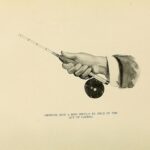“The Market Made Me Do It: The Scandal of the Evangelical College.” Eric Miller draws on the example of the institution I’ve taught at—Spring Arbor University—to highlight the failure of Evangelical colleges to stand against the apparent dictates of “the market”: “The market mind is not the Christian mind. And it’s the market mind that students come to college to gain (whether they want to or not), and for one obvious reason: They believe they need it.”
“The State of the Modern American University.” It’s not pretty. But Lawrence Krauss and Joshua Hochschild have had an interesting exchange on the subject. I’ve linked to Hochschild’s concluding recommendations, but the whole conversation is worthwhile.
“One in the Bow and One in the Stern: Robert Reid and Wesley W. Bates on Casting Their Collaboration.” Robert Reid and Wesley W. Bates discuss their new book, Casting into Mystery, in which Reid contributes the words and Bates (famed for his woodcuts in many Wendell Berry books) the images. As Reid concludes, “At its root, fly fishing is an imaginative act, which links it to other forms of art and creativity. It’s no coincidence that so many artists are drawn to fly fishing and, conversely, that fly fishing inspires so much art.”
“For Small Farms Surviving the Pandemic, Co-ops Are a Lifeline.” Lisa Held writes about the food cooperatives farmers are developing to cope with the market disruptions caused by COVID–19.
“The Patient Ambition of John Milton: A Conversation with Thom Satterlee.” Cynthia L. Haven interviews Thom Satterlee about his new novel, which imagines Milton’s life in Chalfont St. Giles in Buckinghamshire. They reflect on what we might find worth emulating in Milton’s life:
What I admire most about him is a quality that sometimes gets called “patient endurance,” but I’d call “patient ambition.” Here is someone who finds a way to continue his studies and slowly, over the course of 10 years, write an amazing poem, the greatest epic in the English language, even though he’s lost his sight and lives in varying degrees of danger because of his political views.
(Recommended by Robert Moore-Jumonville.)
“Five Defenses of Classical Education in a Time of Civil Unrest.” Benjamin Beier suggests several ways in which a classical education shapes students to respond wisely and redemptively to contemporary social and racial injustices.
“Knowing and Loving: A Review of American Harvest.” Gracy Olmstead reviews Marie Mutsuki Mockett’s new book and concludes “American Harvest is full of empathy and beauty. But its characters—progressive and conservative, Christian and secular alike—often lack any conception of mystery in the subjects they debate together.”
“Maine’s Sublime Canvas of Contradictions.” Lucy Jakub reviews two recent books on Maine artists and ponders the complex relationship between this beautiful place and the artists who try to portray it and make a home in it.
“This is How You Will Heal the Wound.” Tony Woodlief lists some instructions for healing the gashes in our world and our souls. For instance:
Ask a child to show you how to do something she knows better than you. Maybe it’s making a weird noise, or playing a made-up game. Maybe it’s being cheerful in the morning. Get down where she is and ask for her help. See how patient she is with you. Resolve to be this patient with everyone who is learning, including yourself. We are all learning or dying. Both demand the patience of others.
“The Local Case for Reparations.” Charles Marohn proposes a local, practical blueprint for making some kind of restitution for the staggering costs of unjust redlining.
“Start ‘Em Young: Connect Kids with the Land to Yield a Lifetime of Harvests.” Rory Groves details the benefits that accrue when children work alongside their parents to tackle household and farm chores.
“Home Economics: Putting the Family Back into the Economy.” Michael Lind argues that the gravitational center of economics should be the household: “We need a Copernican revolution in the way we think about the economy. Our Ptolemaic economists and economic policymakers treat the market as the center of the social system, orbited by family, state, and civil society. Where is the Copernicus who will provide a vision of a society in which the state, the market, and the nonprofit sector are properly understood to be satellites of the family?”
“The Enlightenment’s Critics.” David Coates reviews Critics of Enlightenment Rationalism, edited by Gene Callahan and Kenneth B. McIntyre, and commends the volume: ”Callahan and McIntrye have offered us a series of critiques of Enlightenment rationalism, featuring a diverse range of thinkers, such as Kierkegaard, Tocqueville, Nietzsche, Polanyi, Heidegger, Gadamer, and Voegelin.”
“Flour Fixated.” Bee Wilson reviews Catherine Zabinski’s Amber Waves: The Extraordinary Biography of Wheat and ponders the unlikely history by which wheat became a dominant source of calories for humans.
”Is Judge Barrett’s ‘Kingdom of God’ Different from Obama’s?” Charles C. Camosy responds to the anti-Catholic, bizarre complaints some have leveled against Judge Amy Coney Barrett’s faith.
“Amy Coney Barrett, Handmaids and Empathy for the Unfamiliar.” In a similar vein, John Inazu urges people to exercise empathy rather than bigotry when trying to understand the religious faith of Barrett or anyone else.
“The New York Times and Nikole Hannah-Jones abandon key claims of the 1619 Project.” Tom Mackaman and David North continue the reporting they’ve done on this for the World Socialist Website and detail the significant revisions that have been silently made to the 1619 Project’s initial claims.
“Cities Get Our Attention, but Rural America has Many of the Same Challenges.” Nathan Beacom argues that the standard political narrative that pits cities against rural areas obscures more than it reveals.
“The Good Death in Psalm 73.” Timothy Kleiser draws on the psalmist and Margaret Edson’s brilliant play Wit to ponder the shape of good death.
“The Dust Bowl, Remembered.” Joshua Heavin wonders if we will learn the lessons from the devastating soil loss of the dust bowl era: “What are we going to value: short-term economic growth, or the land, animals, and solidarity with the people who make Texas the beautiful, wild, and unique place we share?”






